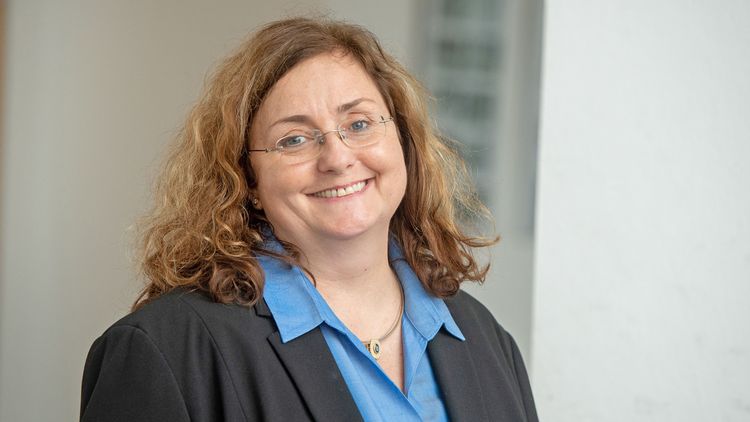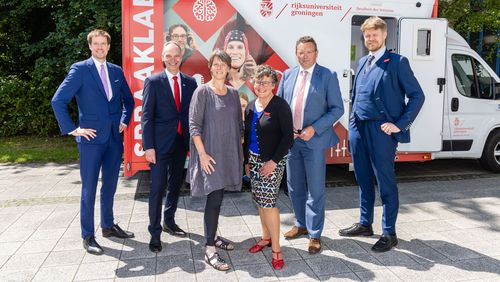Women's Day has been celebrated since 1911. Usually, the Carl von Ossietzky University invites to an event on this occasion. But due to the pandemic, this is not possible this year. However, the appreciation of the day cannot be waived, emphasizes Annett Thiele, Vice President for Early Career Researchers and Equal Opportunities, in an open letter.
Since we will not be able to celebrate International Women's Day on the big stage in 2021, I would like to take this opportunity to draw attention to the importance of Women's Day. As Vice President for Early Career Researchers and Equal Opportunities, I am responsible for this issue qua office. But my advocacy for equality, diversity and opportunity is far more than a duty associated with my office - it is an affair of the heart.
Women's Day was launched in 1911 by the women's and workers' movement to fight for equal rights, higher wages and better working conditions for women, as well as for women's suffrage and against discrimination. It now has a history of more than a hundred years. Strictly speaking, this is probably no reason to rejoice: It would be better if Women's Day were obsolete by now because of the goals it has achieved.
Without a doubt, much has already been achieved in the area of equal rights. But there is still a lot to be done in all areas of society and especially in the world of work. Although women have excellent prerequisites when they start their careers, they are often left behind in the further course of their working lives. And this is true in very important areas, such as payment, staffing management positions or presence on works councils and supervisory boards. Consistent and committed work is therefore needed to move closer to gender equality in the world of work and in society as a whole. This requires the joint efforts of women, men and personalities of the third sex.
Promoting young female scientists is a central concern
I dare to say that the conditions for this at our university can be considered quite good: Equality is a central and profile-forming topic at Carl von Ossietzky University Oldenburg. With the Equal Opportunity Office, the central Equal Opportunity Officer and the decentralized Faculty Equal Opportunity Officers, the anchoring of the issue in the Presidential Board through the function of a Vice President for Equal Opportunities, the audit of the family-friendly university, the Commission for Equal Opportunity, the Women's General Assemblies, the Equal Opportunity Plan and the Equal Opportunity Guideline, a favourable environment is in place.
We want to achieve a balanced gender ratio at our university. The promotion of young female scientists is therefore a central concern. However, we also want to improve the employment situation of women in technology and administration with gender-sensitive personnel development. We see ourselves as a family-friendly university. It is therefore our task to create study and working conditions that are compatible with the diverse lifestyles as well as family responsibilities of university members.
However, it is still the case throughout Germany that female scientists are severely underrepresented, especially in high-paying positions in academia, but also in the non-university sector. This is not due to their professional qualifications or personal suitability. In most cases, structural obstacles, sometimes reinforced by informal practices, are the reason.
To be sure, there has been small progress: Between 2008 and 2018, for example, the proportion of women among doctoral graduates rose by three percentage points to a good 45 percent. There was even an eight percentage point increase among postdoctoral researchers, but the proportion is still not balanced at 31.6 percent. Women still made up less than a quarter of professors in 2018, and the higher the professorships are endowed, the lower the proportion of women. In this respect, there are growth rates, some of which are considerable. However, this is often due to the low starting level. If things continue at this pace, parity in professorships in Germany will not be reached until 2053. We should not wait that long!
The path to equality and parity is highly fragile
For years, our university has held a leading position in the areas of equality, gender mainstreaming and diversity in a nationwide comparison. For more than 30 years, Carl von Ossietzky University has institutionalized the advancement of women. As early as 2011, the promotion of young female scientists was placed at the center of the equal opportunities strategy. Accordingly, as of December 2019, just under 30 percent of professorships were held by women. With the new appointments of 2020, 60 percent of which were women, the proportion has increased further. Nevertheless, it is also true for us: parity has not yet been achieved.
That the path to equality and parity nationwide is not only slow and arduous, but also highly fragile, is demonstrated to us by the corona pandemic. Studies have shown that even after the first wave of the coronavirus, the percentage of scientific articles with women as first authors dropped by 27 percent - coinciding with the closure of daycare centers and schools. In a survey conducted by the Social Science Research Center Berlin (WZB) in fall, 57 percent of female professors said they had submitted fewer publications for publication than planned since the lockdown. Among male professors, only 37 percent said the same. In an academic career, it is essential to have as many high-quality publications as possible. The decline in publications by female professors, especially those with children, is therefore not a marginal note, but an alarm signal and, unfortunately, also a status indicator.
Let us do everything together to ensure that the encouraging progress made in recent years in promoting women in science does not fall victim to the virus. There is no vaccination against it, but there is an obligation to recognize and name the corresponding symptoms and tendencies and to take effective countermeasures!






![[Translate to English:] Five people stand in front of the canteen and hold certificates in front of them.](/fileadmin/_processed/9/c/csm_013_uk_fairtrade_93be056bad.jpg)